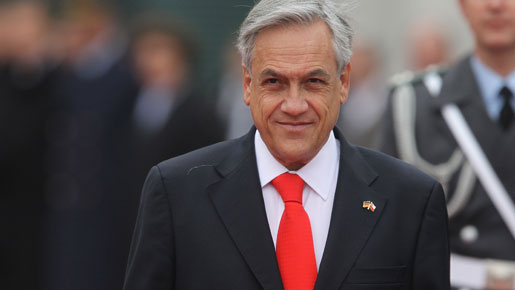
Economist Felipe Larrain, who takes the helm of Chile’s $170bn economy when President-elect Sebastian Pinera’s centre-right administration is sworn in next month, aims to reinvigorate growth and job creation by luring investment with corporate tax breaks and subsidies.
Larrain told El Mercurio’s Sunday edition he sees government spending rising by around four percent this year, saying sharp increases during the outgoing center-left administration’s rule were unsustainable.
The 2010 budget, approved last year, allows for a 4.3 percent rise in government spending.
He also wants a “competitive” peso and believes the outgoing centre-left coalition erred last year when it sold billions of dollars repatriated from windfall copper savings held abroad on the local foreign exchange market, contributing to a 26 percent rise against the dollar in 2009 after a 22 percent slide a year earlier.
“Last year, we had a significant deficit and $7bn were sold directly on the market, and that puts downward pressure on the dollar,” Larrain told El Mercurio’s Sunday edition. “We think that issuing debt in pesos is an alternative, and that it should be done in coordination with the central bank to avoid negative effects.
“Fiscal policy will contribute to keeping the peso competitive. For example, instead of raising government spending by 18 percent in real terms as in 2009, it will increase closer to four percent (this year),” added Larrain, who worked as a professor at Chile’s prestigious Universidad Catolica.
First measures
He said the government’s first measures would include the payment of a subsidy to low income families, stimulus measures to tackle unemployment that include a hiring subsidy for companies, as well as measures to help small- and mid-sized firms that in turn help boost investment.
Critics say Pinera’s pledges to boost annual economic growth to six percent a year and create a million jobs depend too heavily on sharply raising private sector investment and on a sustained global recovery from financial crisis, particularly in China, the biggest consumer of Chile’s main export, copper. Chile is the world’s top copper producer.
And analysts say a divided Congress and union resistance will likely limit Pinera’s efforts.
Larrain told reporters in December he expected the economy to grow by around five percent this year, which is in line with central bank estimates for an expansion of 4.5 percent to 5.5 percent, and sees it averaging six percent over Pinera’s four-year term.
The central bank has forecast a 1.9 percent economic contraction for 2009, when Chile suffered its first recession in a decade due to global crisis.
Larrain said he was inclined to raise a fuel tax, relaxed during the crisis, but had not yet reached a decision. The tax is due to increase by law in March.
“This is an important element in our analysis, and we are oriented in that direction,” he told daily La Tercera, adding he also expected the minimum wage to rise.
Pinera has said his government will consider a tax reform if deemed necessary.
“The President has said if resources are insufficient to carry out our programme, then we could think about a tax reform … protecting individuals and small- and mid-sized firms,” Larrain told La Tercera.
“We have thought about taxing evils … like pollution, congestion, and other mechanisms, like limiting unjustified tax benefits.”

